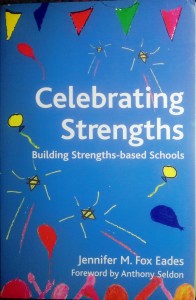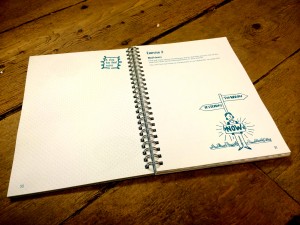Schools in Canada, North Europe, the USA and Australia have successfully applied the Appreciative Inquiry approach and philosophy in the classroom to create a positive education experience. Geelong Grammar School in Australia being a particularly well known example, but there are relatively few UK examples.
Earlier this year, Appreciating People facilitated a conference on Flourishing for international schools, based very much on the work we’ve done with the Liverpool Studio School. Over the past two and a half years, the Studio School has been embedding AI into school life. The focus on increasing awareness of strengths is central to this approach, and Jenny Fox Eades has done pioneering work in this area.
We’ve worked with the Studio School on AI-based initiatives, including the co-design of our original How to be More Awesome journal. The Awesome workbook, which was designed to foster student resilience and wellbeing, is used by all 350 students and has been sold in more than 15 countries.
Everyday AI
Awesome has also been a stepping stone for a range of AI-influenced initiatives at the Studio School – of practical ways of blending AI into existing systems. These include:
- • an Appreciative Leadership workshop for students taking on leadership and student support roles
- • an Appreciative Conversation workshop for all school staff, co-creating a set of questions for student coaching sessions and peer-to-peer support
- • the development of an AI-based reflective practice journal for teachers
- • incorporating AI questions in the student selection/ interview process
- • the use of SOAR™ for strategic planning by the school’s senior management
- • co-designing a student planner edition of How to Be More Awesome, which includes an academic year planner with the school. This new version also includes an entrepreneurship project for students – the Studio School will develop a business to sell the revised journal to UK schools, with the profit funding and expanding the student enrichment programme.
- • an AI-based student evaluation assessing the impact of the journal on their learning
The Studio School recognised that AI training was needed to get the most out of the process, and its next steps are to embed AI practice into the school staff and student leadership. Appreciating People has now run a CPD (continuous professional development) workshop, training Studio School teachers in appreciative conversation skills, appreciative coaching, and how AI can support students leadership and character development. Contact us if you’d like to know more about this service.
As a result, one of the school’s teachers told us: ‘It’s been really helpful learning how to develop strength-based questions and how to get more out of using the Awesome journal.’ ‘Doing the journal helps me to think better,’ said one of the students using it.
In April this year, AP and the Studio School hosted an extremely successful visit from Southern New Hampshire University graduate teachers. The visit was structured around Being AI and the 5 ‘C’s: conversations, cooperation, co-creating, co-design, continuation. The time the teachers spent together fostered mutual learning and collaboration between Liverpool and Knowsley teachers, and the connections are continuing across the ocean.
‘The meeting of two personalities is like the contact of two chemical substances: if there is any reaction, both are transformed.’ Carl Jung
The Studio School
The Liverpool Studio School is based in a Victorian warehouse in Liverpool’s Baltic Triangle and is part of the Northern Schools Trust. Its 350 students, aged from 14 to 18, specialise in the digital media sector. This is an excerpt from their website:
‘Our school educates young people for success in a digital world and, in particular, for employment, entrepreneurship, a new business venture or further study in the digital media sector.
‘Some students apply their skills directly in the gaming, animation, digital marketing and computer technology sectors, others will work for businesses and other organisations that use digital media to develop products and services and connect with clients, consumers, patients and citizens.
‘Our students are creators, rather than consumers, of technology and this empowers them to generate opportunities for themselves within this emerging sector.
‘They are the future digital leaders who will use their expertise to improve the lives of others through the application of digital technology.’
You can find more information about How to Be More Awesome by clicking here…





Comments are closed.